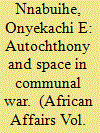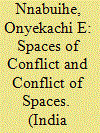|
|
|
Sort Order |
|
|
|
Items / Page
|
|
|
|
|
|
|
| Srl | Item |
| 1 |
ID:
175418


|
|
|
|
|
| Summary/Abstract |
Since the 1990s, there has been an upsurge in conflicts of autochthony in several parts of the world. Autochthony invokes a sense of a politics of belonging and an attachment to the land. In Nigeria, the phenomenon raises questions of citizenship and can reinforce exclusionary practices which in turn provoke widespread violence between different Nigerian populations. Infrastructure provision in a communal conflict environment is a critical element of autochthony struggle, which has yet to be fully explored. Relying on archival sources, focus group discussions, interviews and observation, this article interrogates how the interactions between autochthony and space stimulates communal conflicts and affect infrastructure provision in Jos, Nigeria. The article focuses on how the ‘Black September’ incident in 2001 and its aftermath in Jos has defined citizenship. It argues that the politics of belonging is embedded in infrastructure provision, and understanding this relationship is crucial to understanding and addressing the conflicts in Jos and beyond.
|
|
|
|
|
|
|
|
|
|
|
|
|
|
|
|
| 2 |
ID:
175390


|
|
|
|
|
| Summary/Abstract |
Communal violence, one of the deadliest forms of political violence in Africa, has characterised Jos and other central Nigerian cities since the 1990s. With origins in colonial land and administrative policies at the inception of the city, communal tensions rooted in local elite competition over ‘indigeneship’ and entitlement to political and government positions, access to higher education and land rights have manifested more forcefully in contemporary time claiming over 5,000 lives. This article focuses on the relationship between collective identity, struggle for space and collective violence. It explores persistent attachment to territory by urban communal groups and violent conflicts over those territorial stakes. It does so because emerging research has focused on land rights, neglecting how conflicts structure territory—the living space—and how territory, in turn, shapes conflict. Inspired by the motivation versus opportunity framework, it relies on focus groups, interviews, oral history, archival documents and secondary sources to generate data.
|
|
|
|
|
|
|
|
|
|
|
|
|
|
|
|
|
|
|
|
|